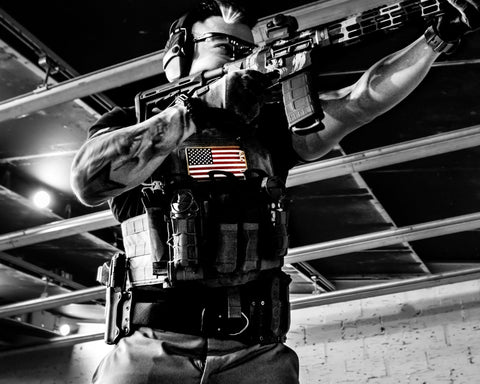Secretary of Defense, Gen. James Mattis is not only one of the most respected service members of all time, but he is arguably one of the most intelligent as well.
His personal library has over 6,000 books that include everything from Roman philosophy to the Personal Memoirs of Ulysses S. Grant. Affectionately called the “Warrior Monk”, Mattis combines outstanding leadership, with tactical proficiency in a manner that has resonated with both his troops and peers.
He is a living legend among U.S. Marines and is renowned as a superb leader who values the lower enlisted as if they were his own children.
As the humble epitome of what a great leader should aspire to be, Mattis has a suggested reading list that he believes everyone in a leadership role should read in order to become a more effective leader.
General Mattis Reading List
Alexander Hamilton by Ron Chernow
Before the First Shot Is Fired: How America Can Win Or Lose Off The Battlefield by Gen Tony Zinni & Tony Koltz
Dereliction of Duty: Lyndon Johnson, Robert McNamara, The Joint Chiefs of Staff, and the Lies that Led to Vietnam by H.R. McMaster
“The war in Vietnam was not lost in the field, nor was it lost on the front pages of the New York Times or the college campuses. It was lost in Washington, D.C.”
—H. R. McMaster (from the Conclusion)
Dereliction Of Duty is a stunning analysis of how and why the United States became involved in an all-out and disastrous war in Southeast Asia. Fully and convincingly researched, based on transcripts and personal accounts of crucial meetings, confrontations, and decisions, it is the only book that fully re-creates what happened and why. McMaster pinpoints the policies and decisions that got the United States into the morass and reveals who made these decisions and the motives behind them, disproving the published theories of other historians and excuses of the participants.
A page-turning narrative, Dereliction Of Duty focuses on a fascinating cast of characters: President Lyndon Johnson, Robert McNamara, General Maxwell Taylor, McGeorge Bundy, and other top aides who deliberately deceived the Joint Chiefs of Staff, the U.S. Congress, and the American public.
McMaster’s only book, Dereliction of Duty is an explosive and authoritative new look at the controversy concerning the United States’ involvement in Vietnam.
Defeat Into Victory: Battling Japan in Burma and India, 1942-1945 by Viscount Slim
Field Marshal Viscount Slim (1891-1970) led shattered British forces from Burma to India in one of the lesser-known but more nightmarish retreats of World War II. He then restored his army’s fighting capabilities and morale with virtually no support from home and counterattacked. His army’s slaughter of Japanese troops ultimately liberated India and Burma.
The Commandant of the Marine Corps Professional Reading List For NCOs
The first edition of Defeat Into Victory, published in 1956, was an immediate sensation selling 20,000 copies within a few days. This is an updated version with a new introduction by David W. Hogan Jr.
Diplomacy by Henry Kissinger
In this controversial and monumental book – arguably his most important – Henry Kissinger illuminates just what diplomacy is.
Duty: Memoirs of a Secretary at War by Robert Gates
The Far Pavilions by M. M. Kaye
Fighting Talk: Forty Maxims on War, Peace, and Strategy by Colin Gray
Colin Gray presents an inventive treatise on the nature of strategy, war, and peace, organized around forty maxims. This collection of mini essays will forearm politicians, soldiers, and the attentive general public against many―probably most― fallacies that abound in contemporary debates about war, peace, and security. While one can never guarantee strategic success, which depends on policy, military prowess, and the quality of the dialogue between the two, a strategic education led by the judgments in these maxims increases the chances that one’s errors will be small rather than catastrophic.
The maxims are grouped according to five clusters. “War and Peace” tackles the larger issues of strategic history that drive the demand for the services of strategic thought and practice. “Strategy” presses further, into the realm of strategic behavior, and serves as a bridge between the political focus of part one and the military concerns that follow. “Military Power and Warfare” turns to the pragmatic business of military performance: operations, tactics, and logistics. Part four, “Security and Insecurity,” examines why strategy is important, including a discussion of nature, dynamic character, and functioning of world politics. Finally, “History and the Future” is meant to help strategists better understand the processes of historical change.
For Country and Corps: The Life of General Oliver P. Smith by Gail Shisler
The Forgotten Soldier by Guy Sajer
Forgotten Soldier recounts the horror of World War II on the eastern front, as seen through the eyes of a teenaged German soldier. At first, an exciting adventure, young Guy Sajer’s war becomes, as the German invasion falters in the icy vastness of Ukraine, a simple, desperate struggle for survival against cold, hunger, and above all the terrifying Soviet artillery. As a member of the elite Gross Deutschland Division, he fought in all the great battles from Kursk to Kharkov.
Sajer’s German footsoldier’s perspective makes The Forgotten Soldier a unique war memoir, the book that the Christian Science Monitor said, “may well be the book about World War II which has been so long awaited.” Now it has been handsomely republished containing fifty rare German combat photos of life and death at the eastern front. The photos of troops battling through snow, mud, burned villages, and rubble-strewn cities depict the hardships and destructiveness of war. Many are originally from the private collections of German soldiers and have never been published before. This volume is a deluxe edition of a true classic.
The Future of Strategy by Colin Gray
Strategy is not a modern invention. It is an essential and enduring feature of human history that is here to stay. In this original essay, Colin S. Gray, a world-renowned scholar of strategic thought, discusses the meaning of strategy and its importance for politicians and the military as a means of achieving desired outcomes in complex, uncertain conditions.
Drawing on a wide range of examples from the Great Peloponnesian War to the Second World War, Vietnam, and the ongoing conflicts in Iraq and Afghanistan, Gray ably shows how great military thinkers of the past and present have acted strategically in their various ideological, political, geographical and cultural contexts. Looking to the future, he argues that strategy will continue to provide a vital tool-kit for survival and security, but that the global threat posed by nuclear weapons remains an on-going challenge without obvious practical solutions. As Gray boldly asserts, there is no promised land ahead, only hard and dangerous times that will require us to master the theory and practice of strategy to secure our own future.
Gates of Fire by Steven Pressfield
Gates of Fire: An Epic Novel of the Battle of Thermopylae
The Greatest Raid of All by Lucas Phillips
‘A deed of glory intimately involved in high strategy’ – Winston Churchill St Nazaire, 1.34am March 28th, 1942 – the destroyer HMS Campbeltown, with her Oerlikons blazing at the enemy guns only a few yards away, crashed with terrific force into one of the enormous lock gates of the Normandie Dock. Operation Chariot had reached its climax. Its object was to destroy the essential gear of the largest dock in the world so that it could not be used by German battleships, and it was brilliantly successful in its main purpose. The story of the assault, under a storm of enemy fire at point-blank range which set the sea itself on fire, and of the heroism of the men in the ‘little ships’ raid, carried out by Royal Navy forces – no fewer than five VC’s were awarded – is one of the most thrilling and vivid to come out of any war. ‘Exciting and moving account of a great epic’ Observer
The Guns of August by Barbara Tuchman
In this landmark, Pulitzer Prize-winning account, renowned historian Barbara W. Tuchman re-creates the first month of World War I: thirty days in the summer of 1914 that determined the course of the conflict, the century, and ultimately our present world. Beginning with the funeral of Edward VII, Tuchman traces each step that led to the inevitable clash. And inevitable it was, with all sides plotting their war for a generation. Dizzyingly comprehensive and spectacularly portrayed with her famous talent for evoking the characters of the war’s key players, Tuchman’s magnum opus is a classic for the ages.
Just and Unjust Wars by Michael Walzer
The Lessons of History by Will and Ariel Durant
In this illuminating and thoughtful book, Will and Ariel Durant have succeeded in distilling for the reader the accumulated store of knowledge and experience from their four decades of work on the ten monumental volumes of “The Story of Civilization.” The result is a survey of human history, full of dazzling insights into the nature of human experience, the evolution of civilization, the culture of man. With the completion of their life’s work they look back and ask what history has to say about the nature, the conduct and the prospects of man, seeking in the great lives, the great ideas, the great events of the past for the meaning of man’s long journey through war, conquest and creation – and for the great themes that can help us to understand our own era. To the Durants, history is “not merely a warning reminder of man’s follies and crimes, but also an encouraging remembrance of generative souls … a spacious country of the mind wherein a thousand saints, statesman, inventors, scientists, poets, artists, musicians, lovers, and philosophers still live and speak, teach and carve and sing…” Designed to accompany the ten-volume set of “The Story of Civilization, The Lessons of History” is, in its own right, a profound and original work of history and philosophy.
Long Walk to Freedom by Nelson Mandela
Nelson Mandela is one of the great moral and political leaders of our time: an international hero whose lifelong dedication to the fight against racial oppression in South Africa won him the Nobel Peace Prize and the presidency of his country. Since his triumphant release in 1990 from more than a quarter-century of imprisonment, Mandela has been at the center of the most compelling and inspiring political drama in the world. As president of the African National Congress and head of South Africa’s antiapartheid movement, he was instrumental in moving the nation toward multiracial government and majority rule. He is revered everywhere as a vital force in the fight for human rights and racial equality.
LONG WALK TO FREEDOM is his moving and exhilarating autobiography, destined to take its place among the finest memoirs of history’s greatest figures. Here for the first time, Nelson Rolihlahla Mandela tells the extraordinary story of his life–an epic of struggle, setback, renewed hope, and ultimate triumph.
March of Folly: From Troy to Vietnam by Barbara Tuchman
Twice a winner of the Pulitzer Prize, author Barbara Tuchman now tackles the pervasive presence of folly in governments through the ages. Defining folly as the pursuit by governments of policies contrary to their own interests, despite the availability of feasible alternatives, Tuchman details four decisive turning points in history that illustrate the very heights of folly in government: the Trojan War, the breakup of the Holy See provoked by the Renaissance Popes, the loss of the American colonies by Britain’s George III, and the United States’ persistent folly in Vietnam. THE MARCH OF FOLLY brings the people, places, and events of history magnificently alive for today’s reader.
Meditations by Marcus Aurelius (161-180 AD)
Meditations is a series of personal writings by Marcus Aurelius, Roman Emperor 161 180 CE, setting forth his ideas on Stoic philosophy. Marcus Aurelius wrote the 12 books of the Meditations in Koine Greek as a source for his own guidance and self-improvement. It is possible that large portions of the work were written at Sirmium, where he spent much time planning military campaigns from 170 to 180. Some of it was written while he was positioned at Aquincum on campaign in Pannonia because internal notes tell us that the second book was written when he was campaigning against the Quadi on the river Granova (modern-day Hron) and the third book was written at Carnuntum. It is not clear that he ever intended the writings to be published, so the title Meditations is but one of several commonly assigned to the collection. These writings take the form of quotations varying in length from one sentence to long paragraphs.
Military Innovation in the Interwar Period by Williamson Murray
This study of major military innovations in the 1920s and 1930s explores differences in innovating exploitation by the seven major military powers. This volume of comparative essays investigates how and why innovation occurred or did not occur, and explains much of the strategic and operative performance of the Axis and Allies in World War II.
My American Journey by Colin Powell
One Bullet Away: The Making of a Marine Officer by Nathaniel Fick
If the Marines are “the few, the proud,” Recon Marines are the fewest and the proudest. Nathaniel Fick’s career begins with a hellish summer at Quantico, after his junior year at Dartmouth. He leads a platoon in Afghanistan just after 9/11 and advances to the pinnacle—Recon— two years later, on the eve of war with Iraq. His vast skill set puts him in front of the front lines, leading twenty-two Marines into the deadliest conflict since Vietnam. He vows to bring all his men home safely, and to do so he’ll need more than his top-flight education. Fick unveils the process that makes Marine officers such legendary leaders and shares his hard-won insights into the differences between military ideals and military practice, which can mock those ideals.
In this deeply thoughtful account of what it’s like to fight on today’s front lines, Fick reveals the crushing pressure on young leaders in combat. Split-second decisions might have national consequences or horrible immediate repercussions, but hesitation isn’t an option. One Bullet Away never shrinks from blunt truths, but ultimately it is an inspiring account of mastering the art of war.
The Personal Memoirs of Ulysses S. Grant by Ulysses S. Grant
Twenty years after Appomattox, stricken by cancer and facing financial ruin, Ulysses S. Grant wrote his Personal Memoirs to secure his family’s future. in doing so, the Civil War’s greatest general won himself a unique place in American letters. His character, intelligence, sense of purpose, and simple compassion are evident throughout this vivid and deeply moving account, which has been acclaimed by readers as diverse as Mark Twain, Matthew Arnold, Gertrude Stein, and Edmund Wilson. Annotated and complete with detailed maps, battle plans, and facsimiles reproduced from the original edition, this volume offers an unparalleled vantage on the most terrible, moving, and inexhaustibly fascinating event in American history. included are 174 letters, many of them to his wife, Julia, which offer an intimate view of their affectionate and enduring marriage.
Rise and Fall of the Great Powers by Paul Kennedy
About national and international power in the “modern” or Post Renaissance period. Explains how the various powers have risen and fallen over the 5 centuries since the formation of the “new monarchies” in W. Europe.
The Rules of the Game by Andrew Gordon
Foreword by Admiral Sir John Woodward. When published in hardcover in 1997, this book was praised for providing an engrossing education not only in naval strategy and tactics but in Victorian social attitudes and the influence of character on history. In juxtaposing an operational with a cultural theme, the author comes closer than any historian yet to explaining what was behind the often described operations of this famous 1916 battle at Jutland. Although the British fleet was victorious over the Germans, the cost in ships and men was high, and debates have raged within British naval circles ever since about why the Royal Navy was unable to take advantage of the situation. In this book, Andrew Gordon focuses on what he calls a fault-line between two incompatible styles of tactical leadership within the Royal Navy and different understandings of the rules of the games.
Scipio Africanus: Greater Than Napoleon by Basil H. Liddell Hart
Scipio Africanus (236183 b.c.) was one of the most exciting and dynamic leaders in history. As commander, he never lost a battle. Yet it is his adversary, Hannibal, who has lived on in public memory. As B.H. Liddell Hart writes, “Scipio’s battles are richer in stratagems and ruses–many still feasible today–than those of any other commander in history.” Any military enthusiast or historian will find this to be an absorbing, gripping portrait.
Sherman: Soldier, Realist, American by Basil H. Liddell Hart
Civil War/Biography. “Liddell Hart’s biography of General Sherman is a masterly performance. It is neither eulogy nor philippic, and the author’s critical apparatus and technique are equaled by his critical judgment . . . It is one of the most thoroughly dignified, one of the most distinguished biographies of the year.”
War, Morality, and the Military Profession by Malham Wakin
This anthology brings together material on two major related topics: the military profession, and morality and war. The revised and updated edition retains those sections that made the original version indispensable in the classroom while incorporating new selections on topics of special concern for the 1980s and beyond. In particular, Colonel Wakin has included essays focusing on the relevance of nuclear deterrence and “just war” theory in the nuclear age. More than a third of the chapters are new. The articles in the first section stress the ethical dimensions of the military profession, considering topics such as the conflict between military values and societal norms, the relation of the military to the state, and the concepts of loyalty, honor, and integrity. New chapters include an essay by Vice Admiral James B. Stockdale suggesting how moral philosophy can serve the profession, contemporary commentaries on the profession by Jacques Barzun and Max Lerner, and new thoughts on ethics and leadership by Colonel Wakin. The essays in Part 2 confront the agonizing moral issues associated with warfare, especially modern warfare. In conjunction with discussions of the laws of war and war crimes, new chapters highlight the continuing debate on nuclear issues. Included are excerpts from the U.S. Catholic Bishops’ pastoral letter, “The Challenge of Peace: God’s Promise and Our Response”; a defense of pacifism by Stanley Hauerwas; arguments about the use of nuclear weapons and nuclear deterrence by Michael Walzer, Michael Novak, and Charles Krauthammer; and some moral reflections on the Strategic Defense Initiative (“Star Wars”) by Kenneth Kemp.
With the Old Breed: At Peleliu and Okinawa by Eugene B. Sledge
“Eugene Sledge became more than a legend with his memoir, With The Old Breed. He became a chronicler, a historian, a storyteller who turns the extremes of the war in the Pacific—the terror, the camaraderie, the banal and the extraordinary—into terms we mortals can grasp.”—Tom Hanks
NEW YORK TIMES BESTSELLER
In The Wall Street Journal, Victor Davis Hanson named With the Old Breed one of the top five books on epic twentieth-century battles. Studs Terkel interviewed the author for his definitive oral history, The Good War. Now E. B. Sledge’s acclaimed first-person account of fighting at Peleliu and Okinawa returns to thrill, edify, and inspire a new generation.
An Alabama boy steeped in American history and enamored of such heroes as George Washington and Daniel Boone, Eugene B. Sledge became part of the war’s famous 1st Marine Division—3rd Battalion, 5th Marines. Even after intense training, he was shocked to be thrown into the battle of Peleliu, where “the world was a nightmare of flashes, explosions, and snapping bullets.” By the time Sledge hit the hell of Okinawa, he was a combat vet, still filled with fear but no longer with panic.
Based on notes Sledge secretly kept in a copy of the New Testament, With the Old Breed captures with utter simplicity and searing honesty the experience of a soldier in the fierce Pacific Theater. Here is what saved, threatened, and changed his life. Here, too, is the story of how he learned to hate and kill—and came to love—his fellow man.
“In all the literature on the Second World War, there is not a more honest, realistic, or moving memoir than Eugene Sledge’s. This is the real deal, the real war: unvarnished, brutal, without a shred of sentimentality or false patriotism, a profound primer on what it actually was like to be in that war. It is a classic that will outlive all the armchair generals’ safe accounts of—not the ‘good war’—but the worst war ever.”—Ken Burns
World Order by Henry Kissinger
Henry Kissinger offers in World Order a deep meditation on the roots of international harmony and global disorder. Drawing on his experience as one of the foremost statesmen of the modern era—advising presidents, traveling the world, observing and shaping the central foreign policy events of recent decades—Kissinger now reveals his analysis of the ultimate challenge for the twenty-first century: how to build a shared international order in a world of divergent historical perspectives, violent conflict, proliferating technology, and ideological extremism.
There has never been a true “world order,” Kissinger observes. For most of history, civilizations defined their own concepts of order. Each considered itself the center of the world and envisioned its distinct principles as universally relevant. China conceived of a global cultural hierarchy with the emperor at its pinnacle. In Europe, Rome imagined itself surrounded by barbarians; when Rome fragmented, European peoples refined a concept of an equilibrium of sovereign states and sought to export it across the world. Islam, in its early centuries, considered itself the world’s sole legitimate political unit, destined to expand indefinitely until the world was brought into harmony by religious principles. The United States was born of a conviction about the universal applicability of democracy—a conviction that has guided its policies ever since.
Now international affairs take place on a global basis, and these historical concepts of world order are meeting. Every region participates in questions of high policy in every other, often instantaneously. Yet there is no consensus among the major actors about the rules and limits guiding this process or its ultimate destination. The result is mounting tension.
Grounded in Kissinger’s deep study of history and his experience as a national security advisor and secretary of state, World Order guides readers through crucial episodes in recent world history. Kissinger offers a unique glimpse into the inner deliberations of the Nixon administration’s negotiations with Hanoi over the end of the Vietnam War, as well as Ronald Reagan’s tense debates with Soviet Premier Gorbachev in Reykjavík. He offers compelling insights into the future of U.S.–China relations and the evolution of the European Union, and he examines lessons of the conflicts in Iraq and Afghanistan. Taking readers from his analysis of nuclear negotiations with Iran through the West’s response to the Arab Spring and tensions with Russia over Ukraine, World Order anchors Kissinger’s historical analysis in the decisive events of our time.
Provocative and articulate, blending historical insight with geopolitical prognostication, World Order is a unique work that could come only from a lifelong policymaker and diplomat.






































Leave a Reply
Your email address will not be published. Required fields are marked *